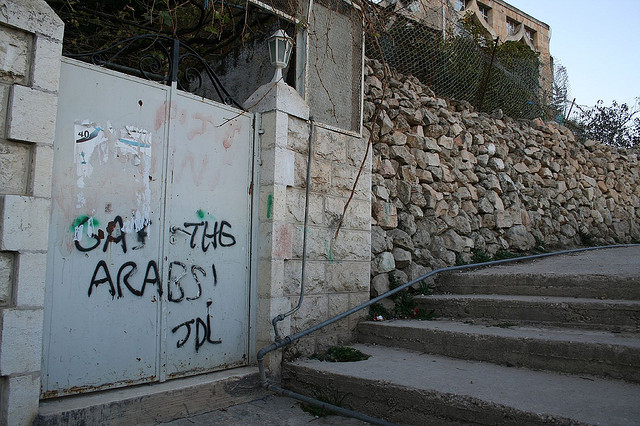I debated with myself about writing an article on the so-called “Levy Report,” a rightwing fantasy about Israel’s settlement project being legal under international law, which suggests that Israel retroactively recognize outposts that were set up contrary to Israeli law.
I thought that all the attention given to this report, which is very unlikely to be implemented or adopted as policy, was giving it more credibility than it deserved. But in the end, I decided that what was really needed was to explore the question of what the report might mean in the long term, and why it was commissioned in the first place.
The consternation over this report is somewhat overblown. At the time of its commission, Israel’s Attorney General, Yehuda Weinstein, declared that he would not be bound by its recommendations. It was a given that he would not accept the recommendations, even if he agreed with them, since he correctly saw the commission as an attempt to circumvent the power of the legal arm of the Israeli government, including both the Attorney General’s office and the High Court of Justice.
Prime Minister Benjamin Netanyahu formed the commission in response to pressure from the settlers, who desperately want to find a way to establish the legality of Jewish settlement anywhere in the West Bank and stop the High Court from interfering with their building plans. Bibi, though, is well aware that such a move is tantamount to annexing the West Bank, which would bring up the choice between banishing its Palestinian inhabitants, establishing a formal apartheid state or granting West Bank Palestinians Israeli citizenship.
Bibi wants to do none of those things, at least not at this stage. Even his good friends in AIPAC would find it impossible to sell either of the first two options in the US, and very few Israeli Jews want to see West Bank Palestinians become Israeli citizens. This way, Bibi gives the settlers what they asked him for and he can shrug and say that acceptance of the plan is out of his hands, since he needs the agreement of the AG to do it.
But there is more to it than that. For some time now, conservatives, both in Israel and the US, have been preparing for a post-two-state future. More than anything else, the Levy Commission has helped pave the way for the rightist vision of that future.
The arguments are familiar and tired. The notion that Article IV of the Geneva Conventions don’t apply to the Occupied Territories has been dismissed by every legitimate international law scholar except for those who are either Israeli, or passionate supporters of Israel. Most Israelis, it is worth noting, don’t make this argument anymore.
The Levy Commission’s assertion that settlement outposts are legal because they were not actively opposed by the Israeli government is absurd to the point of embarrassment. Essentially, this assertion says that as long as it’s the government that breaks the law, it’s not breaking the law. I’ll bet Richard Nixon wished the Levy Commission was in Washington in 1974.
But the document puts something into the discourse. It gives the settlers a government-mandated document written by a commission headed by a former High Court Judge that says outposts can be legalized at the government’s whim.
Even after the Netanyahu government rejects it, the terms of the discussion will have been shifted. Now the idea that illegal outposts can be legal settlements has been given some credibility, even if it has not been officially accepted. That’s the beginning of re-framing the discussion.
The report also ignores almost completely the 2.5 million Palestinians in the West Bank. As B’Tselem’s statement on the report says:
“Almost totally absent from the committee’s report are the 2.5 million Palestinians who live in the West Bank, who are the ones principally harmed by the settlement enterprise. Not a single word of the report refers to their right to use “state lands,” to their exclusion from broad swaths of the West Bank, or to the exploitation of natural resources by the settlers, to name some of the many aspects of the impact of the settlements on the lives of the Palestinian residents. The committee does not address the fact that the planning regime in the West Bank – which is described in minute detail – is intended to serve the settlers and to thwart any possibility of construction by Palestinians. The only harm to human beings mentioned in the report is harm to the settlers – harm to the ability of their communities to develop, and to respond to the natural growth of their population; the difficulties in building basic infrastructure; and the transformation of the residents into building code violators and trespassers against their will, after having taken out loans approved by the State.”
That’s before we consider the fact that the Levy recommendations pushed the discussion in Israel even further into the realm of considering the question of settlements only in terms of Israeli law. I would expect that this will be exported to the United States, gradually, in order to shift the conversation away equally far away from considerations of international law.
The US has long disregarded international law when it is inconvenient, both for ourselves and for Israel. But we have generally paid lip service to it when we had to. This could mean a sharp reduction in the extent to which we have to, in matters concerning Israel.
The irony is that these effects may be amplified precisely because opponents of the Levy Commission’s findings, which even includes chunks of the center-right, will be victorious in their opposition to enacting the Commission’s findings. They may well miss the polarizing impact the findings will have on the discourse around how to resolve the conflict in a post-Oslo world.
Unfortunately, the response of the other side has been to cling to the moribund Oslo process. It’s understandable that many cling to the idea of two states. That’s still the best solution to the Palestinian-Israeli conflict. However, it seems to have been killed off, and buried.
But let’s say it hasn’t been. If we want to continue to pursue a two-state model, we have to recognize that the Oslo formulation, at least, is certainly dead. We have to start thinking about what we can do to change the framework we are working in.
The Palestinian polity is split. Reuniting them is a sine qua non for progress, except that Israel and the US oppose Palestinian reconciliation. That is an unreasonable stance under any circumstances, and particularly so since the party they want to exclude won the only real national election the Palestinians have ever had. This should be the first thing the left strives to change.
There also needs to be a realistic negotiation process. Israel can certainly claim that it will keep Gush Etzion, Ma’ale Adumim and Ariel, the so-called major settlement blocs, but the 2004 letter to Ariel Sharon from George W. Bush has been universally understood to have given Israel those blocs without negotiation. That has to be rescinded, and the major blocs put back on the negotiating table. As Netanyahu loves to say, there needs to be no preconditions. Let’s take him up on that.
These are just two of many examples of issues that could be framed by progressives, whether two-staters or not, as a way to re-conceptualize a peace process that would neither be Oslo nor replicate that failed process.
Unfortunately, we’re not doing that. One-staters on the left are holding to their long-held positions, which is probably the right thing for them to do, since this certainly looks like the beginning of an opportunity to push that agenda. Right-wingers, similarly, are working hard to form their own new one-state reality.
Only the frustrated two-staters are holding on to a vision that has already failed. We need to formulate a new vision. Or else we might as well divide our ranks between those who, given the two one-state options that are moving forward, would choose the right-wing or left-wing one state future.
By holding on to the failed formulations of Oslo, a single-state future is inevitable. Maybe that’s not such a bad thing. I still believe such a state will be torn apart by bloody ethnic conflict, in fairly short order, but who can say for certain? Why take such risks, though. Time is running short. It’s imperative we consider the alternatives.
Photograph courtesy of delayed gratification. Published under a Creative Commons license.






Mitchell, why “will” and not “may” in your “such a state would be torn apart by bloody ethnic conflict, in fairly short order”? What makes you think this is inevitable?
Patrick,
That was actually a little piece of editing confusion. I’ve changed it a bit, and now what I had meant to say there should be clearer.
The democratic forces need to mount a sustained and unrelenting campaign to educate the world outside and inside Israel about the reality of Zionist racism. The posters on the Metro north of NY City are an example and the backlash shows how it is needed. Only this will eventually give the Palestinians their rightful place in the land between the river and the sea, whether 1ss or 2ss. It worked for South Africa!
Mitchell, you say that two-staters have to abandon the failed Oslo process for a new framework, but your two specific suggestions – to reunite the Palestinian polity, and to put the major settlement blocs back on the negotiating table – only recover some of the ground lost from the previous status quo of Oslo. If you think something new is needed, it would be good for you to say (or at least begin to explore) what it is – or to provide a link if you have already done so elsewhere. Thanks.
Hayyim, what specifically do you have in mind? My general point here is not to try to tell the world that I have all the answers, but to start a conversation and to, hopefully, get two-staters to realize that old formulas have failed and that we need to come up with new ideas if we don’t like the alternatives that are on the table right now, which I don’t. I’m saying we erase the maps that have now, get the Palestinian side back into shape where they can negotiate as a unified body. Those are conditions that need to be met. For the rest, everything is back on the table, just the way Bibi wants it–without preconditions.